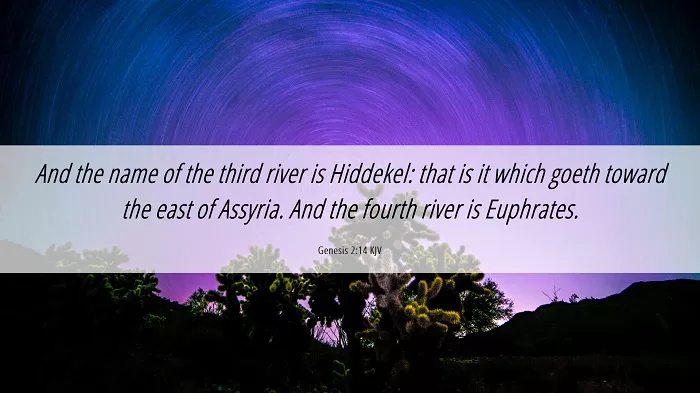Read the Daily Bible Verse Genesis 2:14 To Strengthen Your Spiritual Journey.
Genesis, the first book of the Bible, is foundational for understanding the Judeo-Christian worldview. It lays out the creation of the world and humanity, the fall, and the establishment of God‘s relationship with people. Genesis 2, in particular, provides a detailed account of the creation of Adam and Eve and the Garden of Eden. Within this chapter, Genesis 2:14 stands out as it describes the geographic setting of the garden, mentioning the rivers that flowed through it. This verse has sparked various interpretations, with scholars and theologians discussing its geographical, theological, and symbolic meanings.
The Context on Genesis 2:14 KJV
Genesis 2 begins with a more intimate description of the creation story, focusing on humanity and the Garden of Eden. In Genesis 2:10-14, the passage describes a river flowing out of Eden to water the garden, and from there it divides into four rivers. Genesis 2:14 reads: “And the name of the third river is Hiddekel: that is it which goeth toward the east of Assyria. And the fourth river is Euphrates” (KJV).
Understanding the context of Genesis 2:14 requires considering the geographical and historical references it makes. The Hiddekel is traditionally understood to be the Tigris River, which, along with the Euphrates, is one of the two major rivers that defined Mesopotamia, the cradle of civilization. This region, known for its fertile lands, is where some of the earliest human civilizations emerged. The reference to these rivers provides a real-world anchor for the biblical narrative, suggesting a location for the Garden of Eden and situating it in a place known for its richness and life-sustaining qualities.
The Genesis 2:14 Meaning
The mention of these rivers serves several purposes. Geographically, it ties the narrative to a specific location in the ancient world, lending credibility and tangibility to the account. Theologically, the rivers symbolize God’s provision and the abundance of life that flows from Him. The Tigris and Euphrates are significant not just for their physical characteristics but for their symbolic meanings as sources of life and sustenance in a world created and sustained by God.
Symbolically, the rivers can also represent the flow of God’s grace and the spread of His word. As the rivers branch out from Eden, so does God’s influence extend throughout the world. This can be interpreted as a metaphor for the spread of God’s kingdom and the flourishing of life under His care.
Genesis 2:14 Application in Life
The application of Genesis 2:14 in life can be manifold. On a personal level, it reminds believers of God’s providence and the abundance of His creation. Just as the rivers provided water to the Garden of Eden, God provides for the needs of His creation today. This assurance can inspire trust in God’s provision and care, encouraging believers to rely on Him in all circumstances.
On a communal level, the passage can be seen as a call to stewardship. The rivers that nourished the garden also symbolize the resources God has entrusted to humanity. Believers are called to manage these resources wisely, ensuring that they are used in ways that honor God and sustain His creation.
Comparison with Other Biblical Texts
Genesis 2:14 can be compared with other biblical texts that emphasize God’s provision and the theme of rivers. For instance, in Revelation 22:1-2, a river flows from the throne of God, symbolizing the life-giving presence of God in the New Jerusalem. This imagery echoes the river in the Garden of Eden, suggesting a restoration of the paradise lost due to sin.
Similarly, Psalm 46:4 speaks of a river whose streams make glad the city of God, a metaphor for God’s presence and blessings. These passages reinforce the idea of God as the ultimate source of life and abundance, providing for His people in both physical and spiritual ways.
See Also: Six Benefits of Studying God’s Word
Modern-Day Relevance
In today’s world, the relevance of Genesis 2:14 can be seen in the importance of environmental stewardship and the recognition of God’s provision in our lives. The rivers of Eden symbolize the natural resources God has provided, reminding us of our responsibility to care for the environment. As stewards of God’s creation, believers are called to protect and preserve the earth, ensuring that future generations can also enjoy its abundance.
Moreover, the passage speaks to the spiritual needs of humanity. Just as the rivers sustained the garden, God’s word and presence sustain us today. In a world filled with uncertainty and scarcity, Genesis 2:14 reassures us of God’s unwavering provision and care.
Conclusion
Genesis 2:14, while a brief verse, is rich in meaning and significance. It provides a geographical anchor for the biblical narrative, ties the story of creation to a specific location, and underscores God’s provision and the abundance of His creation. Through its symbolic and theological dimensions, the verse speaks to the spiritual and physical sustenance God provides, reminding believers of their responsibility to care for the earth and trust in God’s provision.
Genesis 2:14 Commentary
Scholars and theologians have offered various interpretations of Genesis 2:14, each shedding light on different aspects of the verse. Some focus on the historical and geographical context, exploring the significance of the Tigris and Euphrates rivers in the ancient Near East. Others delve into the symbolic meanings of the rivers, drawing parallels with other biblical passages that emphasize God’s provision and the flow of His grace.
Overall, Genesis 2:14 invites readers to reflect on the richness of God’s creation and His ongoing provision for humanity. It calls believers to a deeper appreciation of the natural world and a renewed commitment to stewardship, encouraging them to live in harmony with God’s creation and trust in His unfailing care.


